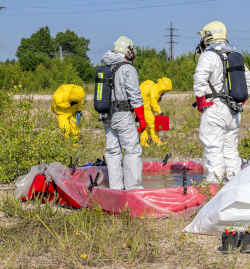HAZWOPER for Emergency Responders
As previously discussed, HAZWOPER applies to releases of, or substantial threats of releases of, hazardous substances without regard to their location. Covered employees include first responders, such as HAZMAT team members, fire and rescue personnel, police, and medical personnel who may respond to emergency releases.
Emergency responders can effectively respond to and manage an incident by completing six activities using the acronym "HAZMAT."
Hazard Identification: Preliminary evaluation prior to entry.
Action Plan: Steps to respond to or control the release.
Zoning: Control the risk and securing the scene.
Managing the Incident: Implementing the Incident Command System.
Assistance: Reporting and determining additional resources needed.
Termination: Decontamination, post-incident analysis, medical surveillance.
Incidental and Uncontrolled Releases
The HAZWOPER standard does not apply to "incidental releases" of hazardous substances, which are releases that do not pose a significant safety or health hazard to employees in the immediate vicinity or to the employees cleaning it up.
Incidental Releases
Incidental releases are limited in quantity, exposure potential, or toxicity and present minor safety or health hazards to employees in the immediate work area or those assigned to clean them up. An example is a laboratory pint-size container that does not pose a significant safety and health threat at that volume.
Uncontrolled Releases
In some instances, releases may be "uncontrolled" and require an emergency response depending on the circumstances of the release (e.g., toxicity and volume of the substance, training and experience of employees in the immediate area, availability of response equipment and PPE, etc.). An example is the release of chlorine gas above the IDLH level, obscuring visibility and moving through a facility.
Knowledge Check Choose the best answer for the question.
4-1. A small, pint-sized container that does not pose a significant safety and health threat would most likely be considered _____.
You forgot to answer the question!

